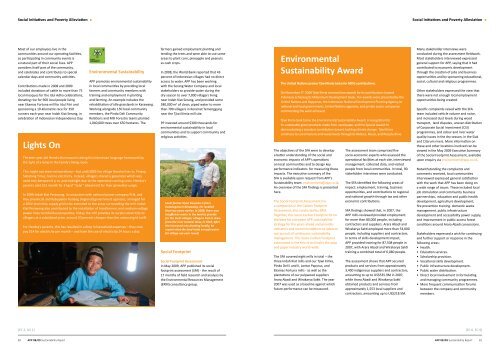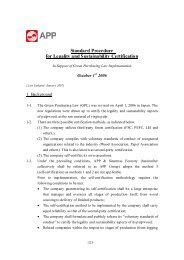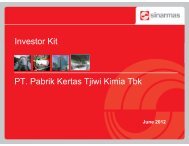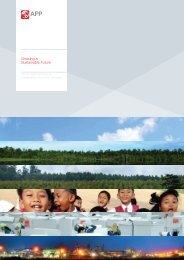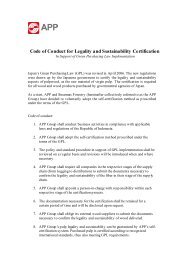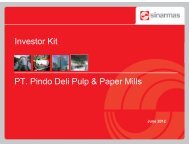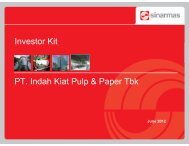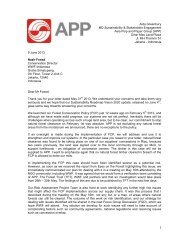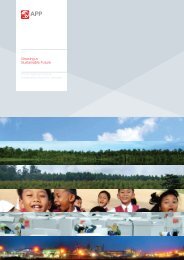APP Sustainability Report 2008-2009 - Asia Pulp and Paper
APP Sustainability Report 2008-2009 - Asia Pulp and Paper
APP Sustainability Report 2008-2009 - Asia Pulp and Paper
You also want an ePaper? Increase the reach of your titles
YUMPU automatically turns print PDFs into web optimized ePapers that Google loves.
Social Initiatives <strong>and</strong> Poverty Alleviation<br />
Social Initiatives <strong>and</strong> Poverty Alleviation<br />
Most of our employees live in the<br />
communities around our operating facilities,<br />
so participating in community events is<br />
a natural part of their social lives. <strong>APP</strong><br />
considers itself part of the community,<br />
<strong>and</strong> celebrates <strong>and</strong> contributes to special<br />
calendar days <strong>and</strong> community activities.<br />
Contributions made in <strong>2008</strong> <strong>and</strong> <strong>2009</strong><br />
included donations of cattle to more than 75<br />
local mosques for the Idul Adha celebrations,<br />
donating rice for 900 local people living<br />
near Ekamas Fortuna mill for Idul Fitri <strong>and</strong><br />
sponsoring a 10-kilometre race for 350<br />
runners each year near Indah Kiat Serang, in<br />
celebration of Indonesian Independence Day.<br />
Lights On<br />
Environmental <strong>Sustainability</strong><br />
<strong>APP</strong> promotes environmental sustainability<br />
in local communities by providing local<br />
farmers <strong>and</strong> community members with<br />
training <strong>and</strong> employment in planting<br />
<strong>and</strong> farming. An example includes the<br />
rehabilitation of idle grassl<strong>and</strong>s in Karawang.<br />
Working alongside 150 local community<br />
members, the Pindo Deli Community<br />
Relations <strong>and</strong> Mill Forestry teams planted<br />
1,040,000 trees over 650 hectares. The<br />
Thirteen-year old Hendra Kurniawan is doing his Indonesian language homework by<br />
the light of a lamp in the family’s living room.<br />
This might not seem extraordinary – but until 2005 the village Hendra lives in, Pinang<br />
Sabatang Timur, had no electricity. Instead, villagers shared a generator which was<br />
used only between 6 p.m. <strong>and</strong> midnight due to the expensive running costs. Hendra’s<br />
parents paid $31 month for 3 kg of “solar” (diesel oil) for their generator usage.<br />
In 2006 Indah Kiat Perawang, in conjuction with national power company PLN, <strong>and</strong><br />
Riau provincial <strong>and</strong> Kabupaten Tualang (regional) government agencies, arranged for<br />
a 20kV electricity supply grid to be extended to the areas surrounding the mill. Indah<br />
Kiat Perawang also contributed to the installation of transformers <strong>and</strong> medium voltage<br />
power lines to individual properties, Today, the mill provides its surplus electricity to<br />
villagers at a subsidised price, around 20 percent cheaper than the national grid tariff.<br />
For Hendra’s parents, this has resulted in a drop in household expenses – they now<br />
pay $14 for electricity per month – <strong>and</strong> have the use of electricity 24 hours a day.<br />
farmers gained employment planting <strong>and</strong><br />
tending the trees <strong>and</strong> were able to use some<br />
areas to plant corn, pineapple <strong>and</strong> peanuts<br />
as cash crops.<br />
In <strong>2008</strong>, the World Bank reported that 43<br />
percent of Indonesian villages had no direct<br />
access to water. <strong>APP</strong> has been working<br />
with the Serang Water Company <strong>and</strong> local<br />
stakeholders to provide water during the<br />
dry season to over 7,000 villagers living<br />
near Indah Kiat Serang, <strong>and</strong> provided some<br />
580,000 m 3 of clean, piped water to more<br />
than 700 villagers in Keramat Temenggung<br />
near the Tjiwi Kimia mill site.<br />
PP invested around $300 thous<strong>and</strong>s for<br />
environmental sustainability in local<br />
communities <strong>and</strong> to support community <strong>and</strong><br />
religious activities.<br />
Local farmer Oyon Kusyono is from<br />
Kutanegara in Karawang. He recalled<br />
that two years earlier, in <strong>2008</strong>, there was<br />
insufficient water in the l<strong>and</strong> to provide<br />
for the local villages; villagers had to draw<br />
from the river instead. Now, in 2010, after<br />
the increased tree planting locally, he<br />
reports that the l<strong>and</strong> holds enough water<br />
for village use year round.<br />
Social Footprint<br />
Social Footprint Assessment<br />
In May <strong>2009</strong>, <strong>APP</strong> published its social<br />
footprint assessment (SFA) - the result of<br />
17 months of field research <strong>and</strong> analysis by<br />
the Environmental Resources Management<br />
(ERM) consultancy group.<br />
Environmental<br />
<strong>Sustainability</strong> Award<br />
The United Nations praises Tjiwi Kimia twice for MDG contributions.<br />
On November 5 th <strong>2008</strong> Tjiwi Kimia received two awards for its contributions toward<br />
Indonesia achieving its Millennium Development Goals. Ten awards were presented by the<br />
United Nations <strong>and</strong> Bappenas, the Indonesian National Development Planning Agency, to<br />
national <strong>and</strong> local governments, United Nations agencies, <strong>and</strong> private sector companies<br />
commending the work achieved.<br />
Tjiwi Kimia took home the Environmental <strong>Sustainability</strong> Award, in recognition for<br />
its sustainable green products made from used paper, <strong>and</strong> the Special Award for<br />
demonstrating a st<strong>and</strong>out contribution toward tackling climate change. Tjiwi Kimia<br />
continues to cut emissions <strong>and</strong> waste levels through its Reduce, Reuse, <strong>and</strong> Recycle drive.<br />
The objectives of the SFA were to develop<br />
a better underst<strong>and</strong>ing of the social <strong>and</strong><br />
economic impacts of <strong>APP</strong>’s operations<br />
on local communities <strong>and</strong> to design key<br />
performance indicators for measuring these<br />
impacts. The executive summary of the<br />
SFA is available upon request from <strong>APP</strong>’s<br />
<strong>Sustainability</strong> team: environment@app.co.id.<br />
An overview of the SFA findings is presented<br />
here.<br />
The Social Footprint Assessment has<br />
a companion in the Carbon Footprint<br />
Assessment, also conducted by ERM.<br />
Together, this Socio-Carbon Footprint forms<br />
the base for a broader <strong>APP</strong> sustainability<br />
strategy for the years ahead <strong>and</strong> provides<br />
indicators <strong>and</strong> recommendations to advance<br />
our pursuit of continuous sustainability<br />
management. This Socio-Carbon Footprint<br />
assessment is the first of its kind in the pulp<br />
<strong>and</strong> paper industry world-wide.<br />
The SFA covered eight mills in total – the<br />
three Indah Kiat mills <strong>and</strong> our Tjiwi Kimia,<br />
Pindo Deli I <strong>and</strong> II, Lontar Papyrus, <strong>and</strong><br />
Ekamas Fortuna mills - as well as the<br />
plantations of our pulpwood suppliers<br />
Arara Abadi <strong>and</strong> Wirakarya Sakti. The year<br />
2007 was used as a baseline against which<br />
future performance can be measured.<br />
The assessment team comprised five<br />
socio-economic experts who assessed the<br />
operational facilities at each site, interviewed<br />
management, collected data, <strong>and</strong> visited<br />
people from local communities. In total, 90<br />
stakeholder interviews were conducted.<br />
The SFA identified the following areas of<br />
impact: employment, training, business<br />
opportunities, <strong>and</strong> contributions to regional<br />
<strong>and</strong> national growth through tax <strong>and</strong> other<br />
economic contributions.<br />
SFA findings showed that, in 2007, the<br />
<strong>APP</strong> mills reviewed provided employment<br />
for more than 80,000 people, including<br />
contractors <strong>and</strong> suppliers. Arara Abadi <strong>and</strong><br />
Wirakarya Sakti employed more than 53,000<br />
people, including suppliers <strong>and</strong> contractors.<br />
In terms of skills development impact,<br />
<strong>APP</strong> provided training for 87,508 people in<br />
2007, with Arara Abadi <strong>and</strong> Wirakarya Sakti<br />
training a combined total of 6,080 people.<br />
The assessment shows that <strong>APP</strong> secured<br />
products <strong>and</strong> services from approximately<br />
3,400 indigenous suppliers <strong>and</strong> contractors,<br />
amounting to up to US$535.9M in 2007,<br />
while Arara Abadi <strong>and</strong> Wirakarya Sakti<br />
obtained products <strong>and</strong> services from<br />
approximately 1,553 local suppliers <strong>and</strong><br />
contractors, amounting up to US$218.5M.<br />
Many stakeholder interviews were<br />
conducted during the assessment fieldwork.<br />
Most stakeholders interviewed expressed<br />
general support for <strong>APP</strong>, saying that it had<br />
contributed to economic development<br />
through the creation of jobs <strong>and</strong> business<br />
opportunities <strong>and</strong> by sponsoring educational,<br />
social, cultural <strong>and</strong> religious programmes.<br />
Other stakeholders expressed the view that<br />
there were not enough local employment<br />
opportunities being created.<br />
Specific complaints raised with the SFA<br />
team included vehicle volume <strong>and</strong> noise,<br />
<strong>and</strong> increased dust levels during wood<br />
transport, l<strong>and</strong> disputes, uneven distribution<br />
of Corporate Social Investment (CSI)<br />
programmes, <strong>and</strong> odour <strong>and</strong> river water<br />
quality issues in the dry season, in the Siak<br />
<strong>and</strong> Citarum rivers. More information on<br />
these <strong>and</strong> other locations involved can be<br />
viewed in the May <strong>2009</strong> Executive Summary<br />
of the Social Footprint Assessment, available<br />
upon enquiry via environment@app.co.id.<br />
Notwithst<strong>and</strong>ing the complaints <strong>and</strong><br />
comments received, local communities<br />
interviewed expressed general satisfaction<br />
with the work that <strong>APP</strong> has been doing on<br />
a wide range of issues. These included local<br />
job stimulation <strong>and</strong> community business<br />
partnerships, education <strong>and</strong> public health<br />
development, agriculture development,<br />
fire prevention training. domestic waste<br />
management. public infrastructure<br />
development <strong>and</strong> accessibility power supply,<br />
<strong>and</strong> improvement in public-access forest<br />
conditions around Arara Abadi concessions.<br />
Stakeholders expressed a wish for continuing<br />
<strong>and</strong> further support or response in the<br />
following areas:<br />
• Health.<br />
• Education services.<br />
• Scholarship provision.<br />
• Vocational skills development.<br />
• Public infrastructure development.<br />
• Public water distribution.<br />
• Direct local involvement in formulating<br />
<strong>and</strong> managing community programmes.<br />
• More frequent communication forums<br />
between the company <strong>and</strong> community<br />
members.<br />
[EC 2, SO 1] [EC 6, EC 9]<br />
80 <strong>APP</strong> 08/09 <strong>Sustainability</strong> <strong>Report</strong> <strong>APP</strong> 08/09 <strong>Sustainability</strong> <strong>Report</strong> 81


